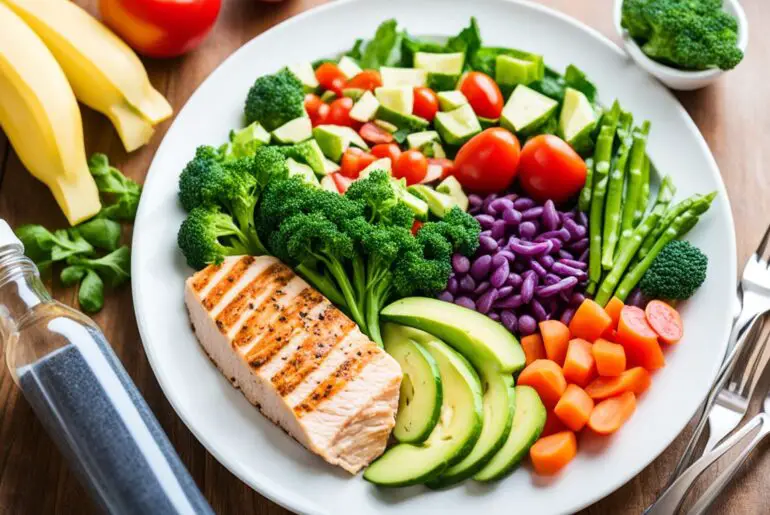Did you know that adjusting calories during the HCG maintenance phase is crucial for long-term weight management? This often-overlooked step plays a significant role in preventing unnecessary weight gain and ensuring body adaptation to higher caloric intake. Let’s explore the effective method of reverse dieting and discover the benefits it offers.
Key Takeaways:
- Gradually increasing calorie intake during the HCG maintenance phase helps the body adapt to higher caloric levels without storing excess calories as fat.
- Reverse dieting regulates the hormonal system and metabolism, promoting optimal functioning.
- It allows individuals to enjoy a calorie surplus without causing weight gain and create a calorie deficit when necessary for continued weight loss.
- Proper macronutrient distribution is essential for successful reverse dieting.
- Adjusting calories based on individual needs, considering factors like age, activity level, muscle mass, and weight management goals, is crucial for optimal results.
The Benefits of Reverse Dieting in HCG Maintenance
Reverse dieting in the HCG maintenance phase offers several benefits. By gradually increasing calorie intake, the body has a chance to adapt to the higher caloric levels without storing excess calories as fat. This method allows for a more sustainable approach to long-term weight management.
One of the key benefits of reverse dieting is its impact on the hormonal system and metabolism. When you follow the HCG diet, your body adjusts to a calorie deficit, and your metabolism slows down. By gradually increasing calorie intake during the maintenance phase, you are signaling to your body that it is safe to increase energy expenditure and restore hormonal balance. This helps prevent weight gain and supports overall health and well-being.
Unlike sudden calorie increases that can lead to weight gain, reverse dieting allows for a controlled calorie surplus. This can be especially beneficial for individuals looking to build muscle or improve athletic performance. By gradually increasing calories, you can provide your body with the energy it needs to recover, repair, and grow without the risk of excess body fat.
Reverse dieting also enables you to create calorie deficits when necessary. If you want to continue losing weight or maintain your current weight, you can adjust your calorie intake accordingly. It provides flexibility and empowers you to make informed decisions about your calorie management based on your goals and individual needs.
Another advantage of reverse dieting is that it helps avoid the negative effects of caloric adaptation. When we consistently consume low calories for an extended period, our bodies adapt by reducing our metabolic rate, making it harder to continue losing weight. Reverse dieting counteracts this adaptation by gradually increasing calorie intake, helping to reset the metabolic rate and support continued progress.
Furthermore, reverse dieting can help bring awareness to your eating habits and promote a more balanced approach to food. By tracking your calorie intake and gradually adjusting it, you become more mindful of the relationship between your energy needs and food choices. This can lead to improved portion control, increased nutrient density, and better overall dietary choices.
The Role of Protein in Reverse Dieting
Protein plays a crucial role in reverse dieting during the HCG maintenance phase. It supports muscle maintenance and helps prevent muscle loss during periods of calorie restriction or weight loss. Adequate protein intake is essential not only for preserving muscle mass but also for optimal overall health.
Include protein-rich foods in your diet, such as lean meats, poultry, fish, eggs, dairy products, legumes, and plant-based protein sources such as tofu and tempeh. If necessary, protein supplementation can be used to meet protein requirements, especially for individuals following a vegetarian or vegan diet.
Protein intake should be balanced with other macronutrients, such as carbohydrates and fats, to ensure a well-rounded and nourishing diet.
Overall, reverse dieting in the HCG maintenance phase offers numerous benefits for weight management and overall health. By gradually adjusting calorie intake, you can support your body’s natural processes and maintain long-term success. Remember to consult with a healthcare professional or registered dietitian before implementing any significant dietary changes to ensure they align with your unique needs and goals.
The Science Behind Reverse Dieting
While scientific research on reverse dieting is limited, many nutritionists and health professionals have found it to be an effective method. Reverse dieting can help the body adapt to higher caloric intakes without causing weight gain. It allows for caloric adaptation, where the metabolic rate adjusts to the increased intake and prevents weight loss plateaus.
Reverse dieting also plays a crucial role in muscular maintenance during weight loss. By gradually increasing calories, this method ensures that the body has enough energy to fuel workouts and maintain lean muscle mass.
Furthermore, reverse dieting helps with fat loss by preventing a rapid rebound in weight. It allows for precise control over caloric intake, making it easier to create a caloric deficit when needed.
“Reverse dieting is like putting your body on maintenance mode, giving it a chance to readjust and stabilize after a period of restricted calories.”
Another important aspect of the science behind reverse dieting is its impact on energy expenditure. By gradually increasing calories, the body can adjust its energy expenditure to match the higher intake, avoiding any sudden drops in metabolic rate.
Lastly, proper macronutrient distribution is essential for successful reverse dieting. Balancing the intake of proteins, fats, and carbohydrates ensures that the body receives the necessary nutrients while adjusting calorie intake.
The Role of Caloric Adaptation
One of the key mechanisms behind reverse dieting is caloric adaptation. When the body has been in a state of caloric deficit for an extended period, it undergoes metabolic changes to preserve energy and protect vital functions.
However, these adaptations can also hinder further weight loss and lead to weight loss plateaus. By gradually increasing calories, reverse dieting allows the body to adapt to the higher intake and reset its metabolic rate to a higher level. This helps prevent weight loss plateaus and promotes continued fat loss.
The Importance of Macronutrient Distribution
Proper macronutrient distribution is crucial during reverse dieting to maintain muscle mass and support overall health. Protein is especially important as it helps preserve muscle mass, promotes satiety, and supports the body’s recovery and repair processes.
Additionally, adequate intake of fats and carbohydrates is necessary for providing energy and supporting various physiological functions. Striking the right balance between these macronutrients ensures that the body receives all the necessary nutrients while adjusting calorie intake.
The science behind reverse dieting provides valuable insights into how this method can effectively help individuals adapt to higher caloric intakes without causing weight gain. By understanding the mechanisms at play, individuals can better navigate the process and achieve long-term weight management success.
Guidelines for Adjusting Calories in HCG Maintenance Phase

When embarking on the HCG maintenance phase, it is crucial to have a clear understanding of how to adjust your calorie intake. Following these guidelines will help you navigate this phase successfully and maintain your weight loss progress.
Gradual Calorie Increase
To allow your body to adapt to the higher caloric levels, it is recommended to gradually increase your calorie intake over several weeks. This approach ensures that your body can adjust without causing unnecessary weight gain.
Calorie Tracking and Weight Monitoring
Tracking your calorie intake and monitoring your weight can provide valuable insights into the optimal calorie range for your individual needs. It allows you to make adjustments as necessary to maintain your weight loss progress.
“By keeping a careful record of your calories and weight, you can better understand how your body responds to different caloric levels and make informed decisions about your diet.”
Consider Food Sensitivity
Food sensitivities can affect how your body responds to certain foods. It is crucial to be aware of any sensitivities you may have and adjust your diet accordingly. Identifying trigger foods and avoiding them can help maintain your progress during the maintenance phase.
Portion Control and Meal Planning
Practicing portion control and meal planning can play a significant role in calorie control. Portioning your meals appropriately ensures that you are not consuming more calories than needed, while meal planning helps you make healthier food choices and maintain a balanced diet.
By adhering to these guidelines, you can successfully adjust your calorie intake during the HCG maintenance phase and promote long-term weight management.
Common Mistakes to Avoid in Adjusting Calories
When adjusting calories in the HCG maintenance phase, it is important to be mindful of common mistakes that can hinder your progress. Here are some key errors to avoid:
- Rapid Calorie Increase: Avoid abruptly increasing your calorie intake, as this can lead to weight gain. Instead, opt for a gradual approach to allow your body to adapt.
- Hidden Sugars and Starches: Watch out for hidden sugars and starches in processed foods, as they can sabotage your weight management efforts. Read labels carefully and choose whole, unprocessed options whenever possible.
- Cautionary Foods: Be cautious of certain foods that may have a higher calorie content or cause weight gain. These can include high-fat snacks, sugary treats, and processed carbohydrates. Practice moderation and limit their consumption.
- Calorie Restriction: Do not excessively restrict your calorie intake during the HCG maintenance phase. It may lead to nutrient deficiencies and stall your progress. Find the balance between calorie control and meeting your nutritional needs.
- Daily Food Intake Tracking: Keep track of your daily food intake to monitor your calorie consumption. Use a journal or a mobile app to record your meals and snacks. This can help you identify any trigger foods or areas where you may be exceeding your calorie goals.
- Weighing Frequency: Regularly weigh yourself to track your progress and ensure you are staying within your desired weight range. By monitoring your weight, you can make necessary adjustments to your calorie intake if needed.
Avoiding these mistakes will help you maintain calorie control and achieve successful long-term weight management during the HCG maintenance phase.
Adjusting Calories Based on Individual Needs

When it comes to adjusting calories in the HCG maintenance phase, it’s important to consider the unique individual needs of each person. Several factors come into play when determining the appropriate caloric range, such as age, activity level, hormonal system, muscle mass, and weight management goals.
Age plays a significant role in determining calorie needs as metabolic rates tend to decrease with age. Older individuals may require slightly fewer calories to maintain their weight compared to younger individuals.
Activity level is another crucial factor to consider. Those who engage in regular physical activity or have a highly active lifestyle typically require more calories to fuel their bodies.
The hormonal system also influences calorie needs. Hormonal imbalances or conditions like thyroid dysfunction can affect metabolism, thus requiring adjustments in calorie intake.
Individuals with higher muscle mass tend to have higher calorie requirements as muscles burn more calories at rest than fat. Therefore, maintaining or building muscle mass can impact the optimal calorie range.
Weight management goals are essential when determining calorie needs. Those aiming for weight loss may need to create a slight calorie deficit, while those aiming for weight maintenance may require a calorie intake that balances energy expenditure.
By considering these individual factors, it is possible to find the optimal calorie range for each person. This personalized approach ensures that everyone can achieve successful long-term weight management by adjusting their calorie intake accordingly.
The Role of Protein in Adjusting Calories
Protein plays a crucial role in adjusting calories during the HCG maintenance phase.Adjusting calories is an important aspect of maintaining weight loss and promoting long-term weight management. But it’s not just about reducing calories; it’s also about ensuring that the body gets the essential nutrients it needs. That’s where protein comes in.
One of the primary benefits of protein is its role in muscle maintenance. When you’re on a weight loss journey, it’s common to lose both fat and muscle. However, adequate protein intake helps prevent muscle loss, allowing you to maintain your muscle mass while shedding unwanted pounds. By maintaining muscle, you can also prevent a decrease in metabolic rate, which can happen during weight loss.
So, how can you incorporate protein into your diet during the HCG maintenance phase? First, focus on consuming protein-rich foods. Lean meats, such as chicken, turkey, and lean cuts of beef, are excellent sources of protein. Fish, such as salmon and tuna, are also high in protein and provide additional health benefits due to their omega-3 fatty acid content. Other sources of protein include eggs, dairy products like Greek yogurt and cottage cheese, as well as beans, legumes, and tofu for those following a vegetarian or vegan diet.
If you find it challenging to meet your protein needs through dietary sources alone, protein supplementation can be a convenient option. Protein powders made from whey, casein, or plant-based sources like pea protein can easily be added to smoothies or mixed with water for a quick protein boost.
It’s important to remember that protein intake should be balanced with other macronutrients for optimal calorie adjustment. Your diet should include a good balance of carbohydrates, fats, and protein to ensure that you’re meeting your nutritional needs while effectively managing your calorie intake.
In summary, protein plays a crucial role in adjusting calories during the HCG maintenance phase. By promoting muscle maintenance and supporting weight loss efforts, protein helps you achieve and maintain your desired weight. Make sure to include protein-rich foods and, if needed, consider protein supplementation to meet your protein requirements. With a balanced diet that includes adequate protein intake, you can successfully adjust your calories and achieve your weight management goals.
Personal Testimonials of Success with Adjusting Calories

Adjusting calories during the HCG maintenance phase has been a game-changer for many individuals on their weight management journey. Through carefully calibrating their calorie intake, they have experienced incredible results and lasting success. The benefits of this approach are backed by personal testimonials and real-life experiences, providing valuable anecdotal evidence.
“Adjusting calories during the HCG maintenance phase has completely transformed my weight management journey. Through gradual calorie adjustment, I was able to find the optimal balance that allowed me to maintain my weight loss without feeling deprived. I’ve never felt better both physically and mentally!” – Sarah
Success stories like Sarah’s are a testament to the effectiveness of adjusting calories during the HCG maintenance phase. Many individuals have found that this approach not only helps them reach their weight management goals but also provides them with a newfound sense of control over their health and well-being.
“After struggling for years with yo-yo dieting and weight gain, I discovered the power of adjusting calories in the HCG maintenance phase. It was a gradual process, but it allowed me to find the perfect balance that helped me maintain my weight loss while still enjoying the foods I love. It’s been life-changing!” – Mark
Mark’s success story is just one of many, highlighting the transformative effects that adjusting calories can have on weight management. These real-life experiences serve as inspiration and motivation for others who are considering or currently adjusting their calorie intake during the HCG maintenance phase.
These personal testimonials demonstrate that adjusting calories during the HCG maintenance phase is not just a theory or concept; it is a proven method that has delivered tangible results for countless individuals. By sharing their experiences, these individuals provide invaluable insights and encouragement for others embarking on a similar journey.
So if you’re looking for long-term weight management success, take inspiration from these personal testimonials and give adjusting calories during the HCG maintenance phase a try. The power to transform your health and achieve lasting results is within reach.
Conclusion
Adjusting calories in the HCG maintenance phase is a fundamental aspect of long-term weight management. The reverse dieting method, by gradually increasing calorie intake, allows the body to adapt without causing weight gain. Following guidelines and considering individual needs are essential for success.
Protein intake and portion control also play vital roles in this process. Protein is crucial for muscle maintenance during weight loss and overall health. By carefully adjusting calories, individuals can achieve an optimal calorie intake that suits their bodies and maintain their weight loss success.
Calorie control is essential for sustainable weight management, and the gradual increase in calorie intake during the HCG maintenance phase allows for a balanced approach. Everyone’s individual needs are different, so it is crucial to find the calorie range that works best for you. By combining proper protein intake, portion control, and calorie adjustments, individuals can achieve long-term weight management and enjoy a healthier lifestyle.
FAQ
How can I adjust my calories during the HCG maintenance phase?
Adjusting calories during the HCG maintenance phase can be done by following a gradual increase in calorie intake over several weeks. This allows the body to adapt to higher caloric levels without causing weight gain. Tracking calories and monitoring weight can help determine the optimal calorie range for individual needs. It is also important to consider any food sensitivities and adjust the diet accordingly. Portion control and meal planning can help ensure calorie control and promote successful long-term weight management.
What are the benefits of reverse dieting in the HCG maintenance phase?
Reverse dieting in the HCG maintenance phase offers several benefits. By gradually increasing calorie intake, the body has a chance to adapt to the higher caloric levels without storing excess calories as fat. This method allows for a more sustainable approach to long-term weight management. Reverse dieting also helps regulate the hormonal system and metabolism, ensuring optimal functioning. Additionally, it allows individuals to enjoy a calorie surplus without causing weight gain and create a calorie deficit when necessary for continued weight loss.
Is there scientific evidence behind reverse dieting?
While scientific research on reverse dieting is limited, many nutritionists and health professionals have found it to be an effective method. Reverse dieting can help the body adapt to higher caloric intakes without causing weight gain. It allows for caloric adaptation, where the metabolic rate adjusts to the increased intake and prevents weight loss plateaus. Reverse dieting also helps with muscular maintenance during weight loss and ensures that energy expenditure remains balanced. Proper macronutrient distribution is essential for successful reverse dieting.
What guidelines should I follow when adjusting calories in the HCG maintenance phase?
When adjusting calories in the HCG maintenance phase, it is essential to follow some guidelines. Gradually increase calorie intake over several weeks to allow the body to adapt. Tracking calories and monitoring weight can help determine the optimal calorie range for individual needs. It is also important to consider any food sensitivities and adjust the diet accordingly. Portion control and meal planning can help ensure calorie control and promote successful long-term weight management.
What are some common mistakes to avoid when adjusting calories in the HCG maintenance phase?
When adjusting calories in the HCG maintenance phase, it is important to avoid common mistakes. Rapidly increasing calorie intake can lead to weight gain, so it is crucial to follow a gradual approach. Beware of hidden sugars and starches, as they can sabotage weight management efforts. Limiting cautionary foods that may cause weight gain is also essential. Daily food intake tracking and frequent weighing can help identify trigger foods and maintain calorie control.
How should I adjust my calories based on my individual needs in the HCG maintenance phase?
Adjusting calories in the HCG maintenance phase requires considering individual needs. Factors such as age, activity level, and hormonal system all play a role in determining the appropriate caloric range. Muscle mass and weight management goals should also be taken into account. Finding the optimal calorie range for each individual is crucial for successful long-term weight management.
What is the role of protein in adjusting calories during the HCG maintenance phase?
Protein plays a crucial role in adjusting calories during the HCG maintenance phase. Sufficient protein intake promotes muscle maintenance during weight loss and helps prevent muscle loss. Including protein-rich foods in the diet, such as lean meats, fish, eggs, and dairy products, is vital. If necessary, protein supplementation can be used to meet protein requirements. Protein intake should be balanced with other macronutrients for optimal calorie adjustment.
Are there any personal testimonials of success with adjusting calories during the HCG maintenance phase?
Many individuals have achieved success with adjusting calories during the HCG maintenance phase. Personal testimonials and success stories provide anecdotal evidence of the effectiveness of this approach. Real-life experiences offer valuable insights and motivation for others who are considering or currently adjusting their calorie intake during this phase.
What is the conclusion regarding adjusting calories during the HCG maintenance phase?
Adjusting calories in the HCG maintenance phase is a key component of long-term weight management. The reverse dieting method, which involves gradually increasing calorie intake, allows the body to adapt and prevents weight gain. Following guidelines and considering individual needs are essential for success. Protein intake and portion control also play important roles. With careful adjustments, individuals can achieve optimal calorie intake for their bodies and maintain their weight loss success.




